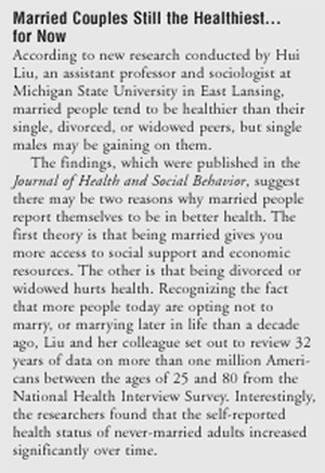US Pharm. 2008;33(12):42.
More Americans Seeking
Medical Care
Data released by
the Centers for Disease Control and Prevention (CDC) show that on average,
each American seeks medical care at a doctor's office or a hospital emergency
department about four times a year, an increase of 26% over the decade from
1996 to 2006. This translates to an estimated 1.1 billion visits to
physicians' offices and hospital outpatient emergency departments in 2006.
According to the CDC/National Center for Health Statistics National Health
Care Survey, the increase outpaced the 11% growth in population during the
same time period.
The data also uncovered that
regardless of where the patient went for medical care, whether it was a
physician's office, outpatient clinic, or emergency department, seven out of
10 left the medical visit with at least one prescription; analgesics were the
most commonly prescribed drug category. Other facts showed that half of all
physician office visits were made by patients with one or more chronic medical
conditions, with hypertension heading the list, followed by arthritis,
hyperlipidemia, and depression. At hospital emergency departments, the number
of visits for treatment of chronic diabetes increased by 43% and visits for
chronic hypertension increased by 51%.

You May Not Be What You Eat
Contrary to popular
belief that eating necessarily leads to increased body fat, a paper published
by Kaveh Ashrafi, PhD, assistant professor of physiology at the University of
California at San Francisco, suggests that the neurotransmitter serotonin,
already known to control appetite and fat build-up, goes through two separate
signaling channels. The one set of signals regulates feeding, and a separate
set of signals regulates fat metabolism. The findings were uncovered by
studying the roundworm, also known as Caenorhabditis elegans, which
shares half of its genes with humans and is often studied as a predictor of
human traits.
The researchers reported that
the signaling pathways are actually composed of a series of molecular events
triggered by neurons in the brain that "instruct" the body to burn or store
fat. If investigators can find the "separate-channel" mechanism in humans,
weight-loss drugs could be developed to attack just the fat-deposition channel
rather than the hunger-dampening pathway, which has already been shown to
limit success in diet adherence. According to Dr. Ashrafi's hypothesis,
"serotonin's control of fat is distinct from feeding. A weight-loss strategy
that focuses only on eating can only go so far. It may be one reason why diets
fail."
Excuse Me, What Did You Say?
Data from the
National Health and Nutrition Examination Survey found that an estimated 16%
of adults (29 million) had speech-frequency hearing loss in 2003–2004. The
findings were reported by Yuri Agrawal, MD, of Johns Hopkins and colleagues in Archives
of Internal Medicine.
The study also uncovered that
there were large demographic disparities among the patients studied. Whites,
men, older participants, and the less educated all had substantially higher
rates of hearing loss than other subgroups. The researchers concluded that
prevention and screening should begin in young adulthood and that
"efforts should be intensified among white and Mexican-American men."
To comment on this article,
contact rdavidson@jobson.com.






